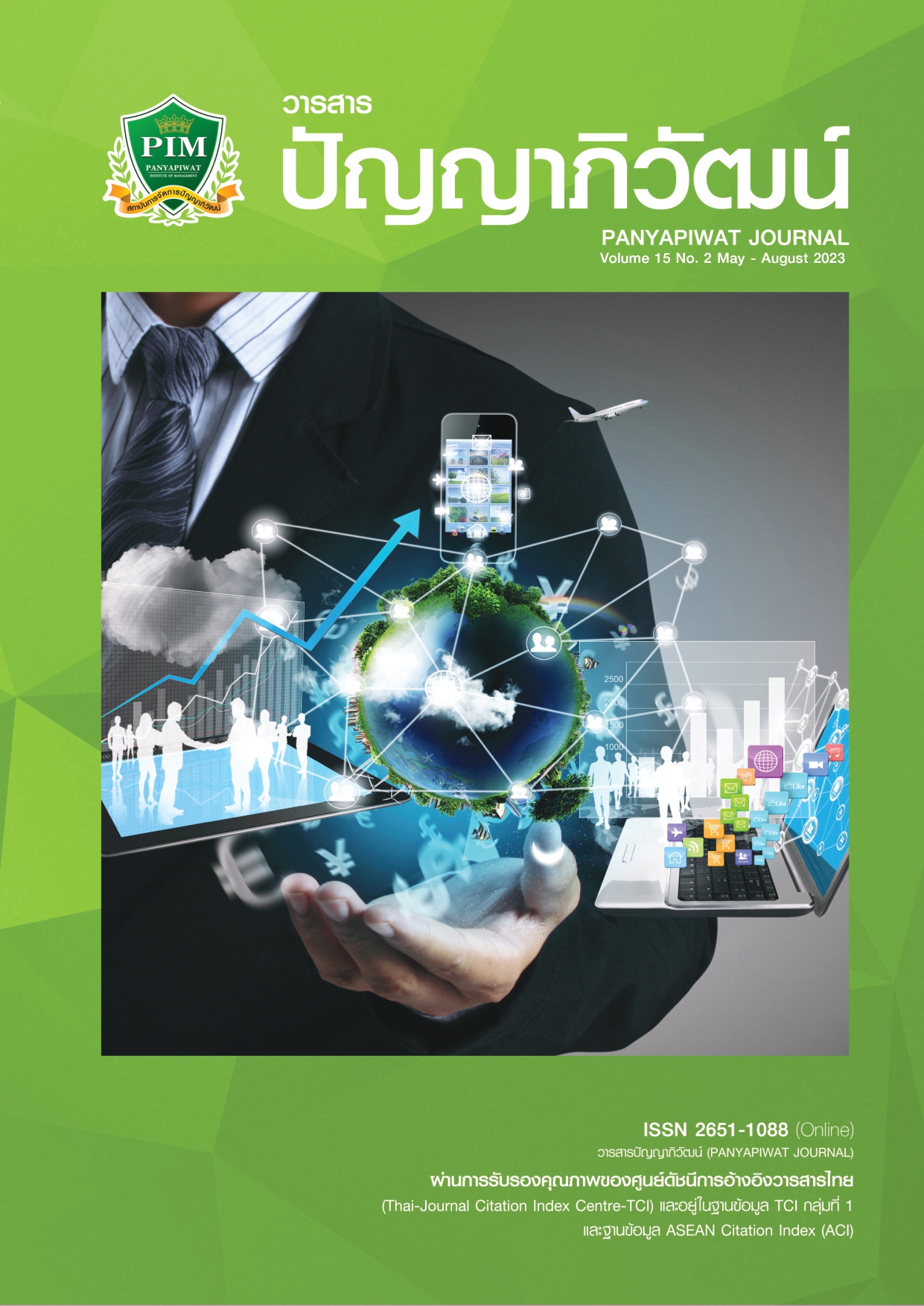แนวทางการพัฒนาความเป็นผู้นำของผู้บริหารรุ่นใหม่ในสถาบันอุดมศึกษาเอกชนไทย
Main Article Content
บทคัดย่อ
ผลการวิจัยพบว่า 1) ทักษะและคุณลักษณะที่จำเป็นในการคัดเลือกบุคลากรให้ดำรงตำแหน่งผู้บริหารรุ่นใหม่ในสถาบันอุดมศึกษาเอกชนไทย ได้แก่ ประสบการณ์ในการทำงานทั้งในด้านการศึกษาและด้านการบริหารจัดการ ความรับผิดชอบ ทัศนคติ อุปนิสัยส่วนตัว อาทิ ความเอื้ออาทร การมีจิตอาสา ความเสียสละ มนุษยสัมพันธ์ ความน่าศรัทธา การสื่อสาร จิตวิทยา และการคิดแบบ Win-Win และที่สำคัญ คือ ความต้องการในการพัฒนาตนเองตลอดเวลา 2) ความต้องการจำเป็นในการพัฒนาทักษะและคุณลักษณะความเป็นผู้นำของบุคลากรในสถาบันอุดมศึกษาเอกชนไทย ได้แก่ 2.1) ด้านทักษะจำเป็นสำหรับอาชีพพบว่า ทักษะที่ควรได้รับการพัฒนา ประกอบด้วย การบริหารธุรกิจและการตลาด งานวิชาการ ภาษาอังกฤษ 2.2) ด้านทักษะทางสังคมพบว่า ทักษะที่ควรได้รับการพัฒนา ประกอบด้วย ด้านจิตวิทยา ความเป็นผู้นำ (ความน่าศรัทธา/บารมี) บุคลิกภาพ และ 3) แนวทางในการพัฒนาสำหรับผู้บริหารรุ่นใหม่ในสถาบันอุดมศึกษาเอกชนไทย ผู้บริหารต้องให้ความสำคัญกับการพัฒนาทั้งทักษะจำเป็นสำหรับอาชีพและทักษะทางสังคม มีการกำหนดแนว ปฏิบัติอย่างชัดเจนและเป็นรูปธรรม สามารถนำไปปฏิบัติได้จริงในการพัฒนาเพื่อเตรียมความพร้อมให้กับผู้บริหารรุ่นถัดไป
Article Details

อนุญาตภายใต้เงื่อนไข Creative Commons Attribution-NonCommercial-NoDerivatives 4.0 International License.
“ข้าพเจ้าและผู้เขียนร่วม (ถ้ามี) ขอรับรองว่า บทความที่เสนอมานี้ยังไม่เคยได้รับการตีพิมพ์และไม่ได้อยู่ระหว่างกระบวนการพิจารณาลงตีพิมพ์ในวารสารหรือแหล่งเผยแพร่อื่นใด ข้าพเจ้าและผู้เขียนร่วมยอมรับหลักเกณฑ์การพิจารณาต้นฉบับ ทั้งยินยอมให้กองบรรณาธิการมีสิทธิ์พิจารณาและตรวจแก้ต้นฉบับได้ตามที่เห็นสมควร พร้อมนี้ขอมอบลิขสิทธิ์บทความที่ได้รับการตีพิมพ์ให้แก่สถาบันการจัดการปัญญาภิวัฒน์หากมีการฟ้องร้องเรื่องการละเมิดลิขสิทธิ์เกี่ยวกับภาพ กราฟ ข้อความส่วนใดส่วนหนึ่งและ/หรือข้อคิดเห็นที่ปรากฏในบทความข้าพเจ้าและผู้เขียนร่วมยินยอมรับผิดชอบแต่เพียงฝ่ายเดียว”
เอกสารอ้างอิง
Abullah, A. R., Muhammad, M. Z., & Md Naris, N. A. (2019). The role of soft skills within business students towards graduate employability. Journal of Entrepreneurship and Business, 7(2), 1-14.
Asbari, M., Purwanto, A., Ong, F., Mustikasiwi, A., Maesaroh, S., Mustofa, M., Hutagalung, D., & Andriyani, Y. (2020). Impact of hard skills, soft skills and organizational culture: Lecturer innovation competencies as mediating. EduPsyCouns: Journal of Education, Psychology and Counseling, 2(1), 101-121.
Carnevale, A. P. (2013). 21st century competencies for college and career readiness. NCDA Publishing.
Dean, S. A. (2017). Soft skills needed for the 21st century workforce [Doctoral dissertation]. Walden University.
Dung-nga, P., Wichitputchraporn, W., & Niyamabha, A. (2022). A causal model of organizational structure, leadership of the school administrators with organizational climate, and effective team as mediators, affecting innovation schools for large-sized secondary schools under the offce of the basic education commission. Panyapiwat Journal, 14(3), 166-177. [in Thai]
Katz, R. (1974). Skills of an effective administrator. Harvard Business Review.
Kautz, T. D., Heckman, J., Diris, R., ter Weel, B., & Borghans, L. (2014). Fostering and measuring skills: Improving cognitiveand non-cognitiveskills to promote lifetime success. OECD Publishing.
Lhakard, P. (2021). The role of the human resource in the future challenging issues. Journal of Research and Academics, 4(2), 251-260. [in Thai]
Mungsook, K. (2021). The professional characteristics administrator affecting teacher’s core competency in school under the Secondary Educational Service Area Office 18, Rayong Province. Panyapiwat Journal, 13(2), 236-250. [in Thai]
Ngamsert, S. (2020). Professional education administration in higher education in the 21st century. Interdisciplinary Studies Journal Mahidol University, 20(1), 2-13. [in Thai]
Norakit, N., & Tharasrisutti, P. (2021). The 21st century leadership characteristics as perceived by teachers in schools under school network group 34, Minburi District office, Bangkok Metropolis. Joural of Roi Kaensam Academi, 6(1), 55-69. [in Thai]
Penratanahiran, R., & Thongkham, K. (2021). A survey of soft skills needed in the 21st century workplace. Rajabhat Rambhai Barni Journal, 15(1), 59-69. [in Thai]
Proyrungroj, P., & Chansom, N. (2021). Soft skills factors affecting to workers performance effectiveness of generation y group in Bangkok. Rajapark Journal, 15(42), 117-120. [in Thai]
Robles, M. (2012). Executive perceptions of the top 10 soft skills needed in today’s workplace. Business Communications Quarterly, 75(4), 453-465.
Sanpayao, K., Totest, I., & Wongwatthanaphong, K. (2022). Skills needed by government workers in the future world. Journal of Administration and Social Science Review, 5(3), 131-140. [in Thai]
Sergiovanni, T. J., & Starratt, R. J. (1983). Supervision: Human perspectives. McGraw-hill.
Shuayto, N. (2013). Management skills desired by business school deans and employers: An empirical investigation. Business Education & Accreditation, 5(2), 93-105.
Sonwa, S., Sutamdee, C., & Koawsa-ad, W. (2018). The characteristics of leaders in modern government organizations. Journal of Humanities and Social Sciences Surin Rajabhat University, 20(2), 399-411. [in Thai]
Sopa, A., Asbari, M., Purwanto, A., Santoso, P., Mustofa, Hutagalung, D., Maesaroh, S., Ramdan,
M., Primahendra, R. (2020). Hard skills versus soft skills: Which are more important for Indonesian employees innovation capability. International Journal of Control and Automation, 13(2), 156-175.
Sonwa, S. (2018). Handout of administrator’s strategic leadership subject code BLA3504. Department of Public Administration, Faculty of Law and Politics, Roi Et Rajabhat University.
Thongsawat, S., Rodprasert, P., & Chullasap, N. (2020). States, problems and developing guidelines of academic staffs organization commitment of the private universities in Thailand. Journal of Suvarnabhumi Institute of Technology (Humanities and Social Sciences), 6(2), 353-368. [in Thai]


